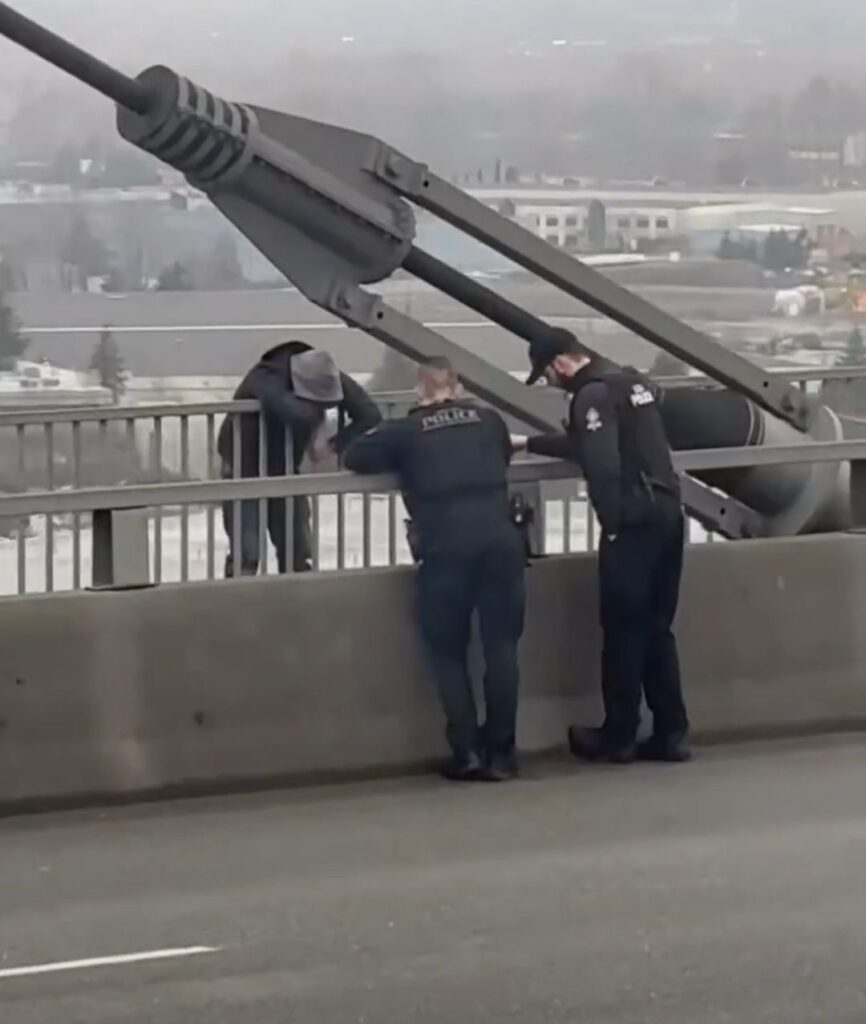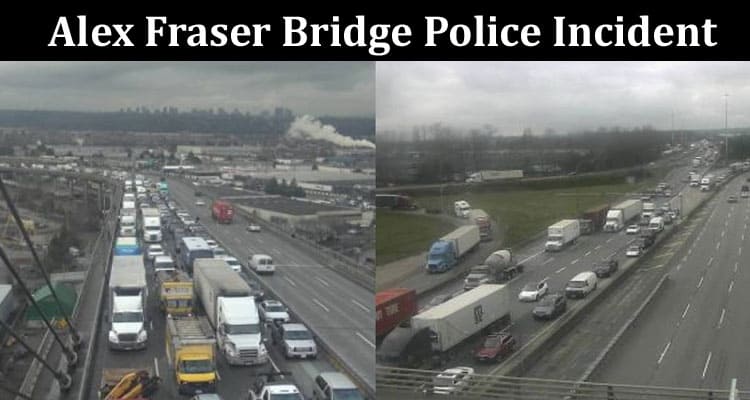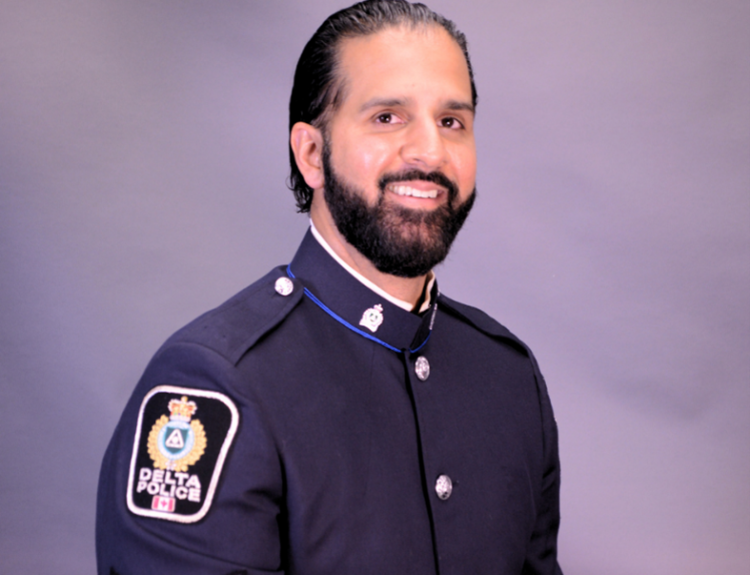Delta police say irate drivers didn’t help matters as they tried to deal with a mental health crisis that closed the Alex Fraser bridge on Monday for hours after a distraught man tried to commit suicide but was eventually persuaded to not go through with it. On January 23, shortly after noon, the Delta Police Department (DPD) received a report of an individual who was outside the safety rail on the southbound side of the Alex Fraser Bridge. DPD officers arrived on the scene and began negotiating with the man. Officers actively negotiated with the distressed male from a safe distance, a strategy designed to de-escalate and reduce the anxiety of an individual already in a heightened emotional state.
By PD Raj – Senior Writer DESIBUZZCanada
NORTH DELTA – Delta police say irate drivers didn’t help matters as they tried to deal with a mental health crisis that closed the Alex Fraser bridge on Monday for hours after a distraught man tried to commit suicide but was eventually persuaded to not go through with it.
On January 23, shortly after noon, the Delta Police Department (DPD) received a report of an individual who was outside the safety rail on the southbound side of the Alex Fraser Bridge. DPD officers arrived on the scene and began negotiating with the man. Officers actively negotiated with the distressed male from a safe distance, a strategy designed to de-escalate and reduce the anxiety of an individual already in a heightened emotional state.
Unfortunately, southbound lanes on the bridge were closed for the safety of the distressed male and first responders for an extended period. A variety of reasons are considered for closing lanes on the bridge. The bridge deck is a loud environment; the sound of engines, tires, and road noise, is complicated by heavy gusts of heavy wind and the sway of the bridge, elevating the danger to those involved. While the overall decision to close the bridge is complex, it is guided by the DPD’s priority to preserve life.
Various distractions impacted the DPD’s priority to preserve life, including drivers “rubber-necking” to get a view, honking horns, yelling at the individual in crisis, and even encouraging them to take action. Some impacted drivers walked up the bridge deck, made contact with officers, interfered with the negotiations, and even videoed or photographed the individual in crisis.
During this closure, several commuters were gridlocked on the bridge leading to frustration and causing drivers to take chances and drive aggressively. Additional impacts included secondary collisions.

Just before 6:00 pm, a frustrated motorist went around several highway vehicles managing the road closure, striking a highway vehicle and a concrete barrier, causing several thousand dollars of damage to all vehicles involved. Some DPD officers were forced to disengage from the crisis to deal with this incident.
Shortly after 7:00 pm, another driver ignored a flagger’s direction and drove around barricades, placing the flagging staff, highway workers, the individual in crisis, and first responders in danger. Upon further investigation, this driver was found to be impaired and issued a 90-day driving suspension along with a 30-day vehicle impound.
Shortly before 8:00 pm, after standing on a small platform outside the bridge railing and hanging for nearly 8 hours, negotiations with the impacted male concluded with him agreeing to climb back over the rail to safety and surrendering to the officers working to help him. The individual was then provided with the medical attention he needed.
The DPD team worked with various partners to safely manage and resolve this situation, including RCMP officers, a high-angle rescue team from the Delta Fire Department, the Integrated Emergency Response Team, Mainroad highway contractors, BC Ambulance, and the Canadian Coast Guard.
Chief Neil Dubord stated, “I am proud of the work and commitment of all first responders, which led to the team saving the distressed individual’s life in a mental health crisis. We also recognize that the bridge closure caused frustrations, and our team will review this incident with our partners to determine how we can lessen the future impact on the public.”
As first responders, the DPD sees the impacts of mental health daily. It can grind lives to a halt, as we saw yesterday, but to stop the stigma surrounding mental health, everyone must do their part. While Bell Let’s Talk Day tomorrow will bring further awareness to the stigma, mental health should be a 365-day priority.

Advocates said the behaviour is a reminder to put temporary traffic frustrations into perspective.
“You’ve got the police and the people who are trying to help that person live, send the message that people care, and then folks who are are honking their horns are inadvertently sending the message that their commute home is more important,” said B.C. Crisis Centre executive director Stacy Ashton, who saw the crisis herself on her commute home over the bridge.
“I can guarantee you that the person who is in the mental health crisis is having the worse day.”
Ashton, who’s worked in the suicide prevention field for roughly 30 years, said most people are understanding when they see someone in crisis and it’s “fairly rare” to see someone frustrated to the point of driving dangerously.
“The message I would give to folks who are just out in the world is that crisis can come anytime. You don’t know what’s going to happen next in your life and something overwhelming can happen … and when that happens, you can reach out for help,” she said.
After eight hours, the man agreed to climb back over the rail to safety.
Police said the factors determining whether to close all or part of the bridge are “complex.”
“The bridge deck is a loud environment; the sound of engines, tires and road noise is complicated by heavy gusts of heavy wind and the sway of the bridge, elevating the danger to those involved. While the overall decision to close the bridge is complex, it is guided by the DPD’s priority to preserve life,” the police statement said.
B.C.’s Ministry of Transportation, which is responsible for several of the Lower Mainland’s bridges, says it works with crisis centres and law enforcement agencies, among others, “to ensure everything possible is done to prevent suicide attempts on our structures and keep people safe.”
If you or someone you love is suffering, please ask for help or offer it. Below is a list of resources with experts available 24/7, 365 for anyone in crisis.
Fraser Health Crisis Line 604-951-8855 or 1-877-820-7444
Crisis Services Canada (www.talksuicide.ca) 1-833-456-4566
Crisis Centre BC (www.crisiscentre.bc.ca) 1-800-784-2433
Kids Help Phone (www.kidshelpphone.ca) 1-800-668-6868
310Mental Health Support (no area code required) 310-6789Canadian Mental Health Association (www.cmha.ca)
















41 Comments
Aisadoge
1 year agoHello! My name is Aisa. I am 9 years old.
I live in Lithuania. Please watch my video.
I made it myself. I hope you like it.
Alan Walker | Vinai | Kura
youtube.com/watch?v=7kdIld6uuGI
kn314
8 months agocost of clomid price buy clomid tablets get generic clomiphene without rx can i purchase generic clomid pills where buy cheap clomid no prescription cost generic clomid without a prescription can i purchase generic clomid without insurance
can cialis pills cut half
8 months agoThis website positively has all of the tidings and facts I needed adjacent to this participant and didn’t know who to ask.
does flagyl cause anxiety
8 months agoThis is the type of enter I turn up helpful.
0c9l7
8 months agopurchase zithromax pills – buy floxin 200mg pills buy flagyl 400mg pills
g82a3
8 months agobuy rybelsus 14mg for sale – buy cyproheptadine 4 mg online cyproheptadine order online
vntd9
8 months agoorder domperidone pills – buy cyclobenzaprine 15mg buy flexeril 15mg
380ma
8 months agobuy generic propranolol online – methotrexate 2.5mg us methotrexate price
rg5qb
8 months agocheap amoxil without prescription – amoxicillin generic buy ipratropium online cheap
n8q25
8 months agozithromax 250mg for sale – brand bystolic 20mg brand bystolic 5mg
qjyvx
8 months agobuy cheap clavulanate – https://atbioinfo.com/ buy generic ampicillin over the counter
54qgk
8 months agoorder nexium 20mg pill – anexamate.com buy nexium 20mg generic
ujqua
8 months agowhere to buy warfarin without a prescription – anticoagulant losartan uk
40qgh
8 months agobuy meloxicam without a prescription – https://moboxsin.com/ mobic 15mg price
ud4tu
8 months agobuy deltasone – https://apreplson.com/ cheap prednisone 10mg
6geuw
8 months agothe blue pill ed – fast ed to take site buy ed pills no prescription
ot88m
8 months agoamoxil over the counter – comba moxi amoxil tablets
r2c59
7 months agopurchase fluconazole generic – https://gpdifluca.com/ fluconazole where to buy
pm3ew
7 months agopurchase cenforce pills – on this site cenforce 50mg cost
ajayp
7 months agois there a generic cialis available? – how long does cialis take to work 10mg generic cialis
Conniehecum
7 months agoorder zantac 300mg online cheap – https://aranitidine.com/# zantac for sale
5r4dj
7 months agogeneric tadalafil canada – tadalafil (exilar-sava healthcare) version of cialis] (rx) lowest price does cialis lowers blood pressure
Conniehecum
7 months agoI’ll certainly bring back to be familiar with more. sitio web
5rn57
7 months agoviagra professional 100 mg pills – https://strongvpls.com/ where to buy viagra in canada
sjyyv
7 months agoI am in fact delighted to glitter at this blog posts which consists of tons of worthwhile facts, thanks representing providing such data. buy amoxicillin generic
Conniehecum
7 months agoThis is a topic which is in to my heart… Diverse thanks! Faithfully where can I upon the connection details due to the fact that questions? https://ursxdol.com/cialis-tadalafil-20/
u8biw
7 months agoThanks towards putting this up. It’s okay done. https://prohnrg.com/product/lisinopril-5-mg/
Conniehecum
7 months agoThis is the compassionate of literature I positively appreciate. https://ondactone.com/spironolactone/
Conniehecum
6 months agoThanks an eye to sharing. It’s top quality.
https://proisotrepl.com/product/propranolol/
Conniehecum
6 months agoProof blog you be undergoing here.. It’s severely to assign high quality belles-lettres like yours these days. I truly recognize individuals like you! Take mindfulness!! http://web.symbol.rs/forum/member.php?action=profile&uid=1171354
Conniehecum
6 months agoforxiga 10 mg tablet – on this site forxiga 10mg generic
Conniehecum
6 months agoorlistat buy online – https://asacostat.com/# how to buy xenical
Conniehecum
6 months agoMore posts like this would add up to the online play more useful. http://web.symbol.rs/forum/member.php?action=profile&uid=1175018
EkauFEALS
4 months agoYou can conserve yourself and your ancestors by being heedful when buying medicine online. Some druggist’s websites operate legally and sell convenience, privacy, sell for savings and safeguards over the extent of purchasing medicines. buy in TerbinaPharmacy https://terbinafines.com/product/norvasc.html norvasc
qrmof
4 months agoWith thanks. Loads of erudition! TerbinaPharmacy
slots big bass bonanza
4 months agoMore peace pieces like this would urge the web better.
Sheriff Badge
3 months agoThis is a topic I’ve been curious about. Thanks for the detailed information.
question
4 weeks agoI’ve been researching Paybis for a while now, especially after ending up broke, and I’m still not fully convinced whether it deserves all the attention it gets.
Still, it’s definitely a noticeable name in the digital asset market, particularly
for people in Germany who are trying to find new financial tools.
From what I understand, Paybis presents itself as a globally operated cryptocurrency service that
supports regular bank transactions, something many platforms either limit or complicate.
What initially caught my eye is how Paybis seems to bridge traditional German banking methods with the
crypto world. Many exchanges focus only on crypto-to-crypto trades, while Paybis allows users to buy crypto using debit cards.
I’m not saying the process is perfect, but
it does seem aimed at beginners rather than just advanced traders.
Another aspect worth noting is the selection of supported assets.
Paybis doesn’t restrict itself to only the major tokens. Instead, it offers multiple
altcoins, which might attract users who are trying new projects.
Still, things like update speed are worth checking before making
decisions.
Security and compliance also come up often around Paybis.
The platform highlights KYC checks, which can feel responsible for users in Germany, though
others might see it as restrictive. I’m still
undecided, but it does suggest Paybis tries to operate as a legitimate marketplace.
When it comes to fees, reviews seem divided. Some say Paybis is clear about costs, while others note that pricing can change with transaction type.
This isn’t unusual in the crypto industry, but it
means users should compare alternatives before moving money.
Overall, I wouldn’t call Paybis the best option, but it does seem like a platform worth exploring,
especially for someone in Germany trying to build a
new starting point. I’m still forming my opinion, but it
seems relevant enough to justify further research.
Pswcbt
1 week agoconcerts at viejas casino live entertainment
best casinos in usa
online casino x
Uuvewu
6 days agoonline casino mgm betmgm-play mgm bet app
Bjxxcp
1 day agomcluck Massachusetts mcluckcasinogm.com mcluck FL